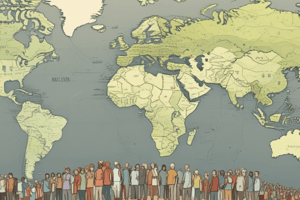Podcast
Questions and Answers
According to the UN, what is the projected global population range for 2050?
According to the UN, what is the projected global population range for 2050?
- Less than 8 billion
- Between 8.3 and 10.9 billion (correct)
- More than 11 billion
- Around 7 billion
What is Jorgen Randers' prediction about the world population peak?
What is Jorgen Randers' prediction about the world population peak?
- 10.9 billion by 2100
- More than 11 billion by 2040
- 8.1 billion in the early 2040s (correct)
- Less than 8 billion by 2040
What is the current estimated number of global births per year?
What is the current estimated number of global births per year?
- 126 million
- 140 million (correct)
- More than 150 million
- 57 million
What is the estimated global population in 2030 according to the 2019 Revision?
What is the estimated global population in 2030 according to the 2019 Revision?
What is the estimated global population peak according to the Institute for Health Metrics and Evaluation?
What is the estimated global population peak according to the Institute for Health Metrics and Evaluation?
What is the probability that world population will not stabilize this century according to a University of Washington professor?
What is the probability that world population will not stabilize this century according to a University of Washington professor?
Flashcards
Peak UN Population Prediction
Peak UN Population Prediction
The UN projects the world population may stop growing around this number by 2100.
Jorgen Randers' Population View
Jorgen Randers' Population View
Argues urbanization reduces fertility, estimating an earlier population peak and subsequent decline.
UN's projected rates by 2100
UN's projected rates by 2100
Crude birth rates will continue to decrease, while crude death rates will increase approaching 2100.
Global Births Trend
Global Births Trend
Signup and view all the flashcards
Global Deaths Trend
Global Deaths Trend
Signup and view all the flashcards
Demographic Transition
Demographic Transition
Signup and view all the flashcards
Study Notes
World Population Growth Projections and Trends
- The UN predicts that world population growth may reach zero by 2100, with a plateau of 10.9 billion people, but there are other estimates that differ.
- Statistician Jorgen Randers argues that traditional projections do not consider the impact of global urbanization on fertility and predicts a peak population of 8.1 billion in the early 2040s, followed by decline.
- A University of Washington professor states that there is a 70% probability that world population will not stabilize this century.
- The UN reports a decline in crude birth and death rates from 1950 to 2015 and projects further decline to 11.6/1,000 and an increase in death rates to 11.2/1,000 by 2100.
- The total number of births globally is currently 140 million/year and projected to peak at 141 million/year during 2040-2045, then decline slowly to 126 million/year by 2100.
- The total number of deaths is currently 57 million/year and projected to grow steadily to 121 million/year by 2100.
- The UN predicts that the global population will reach between 8.3 and 10.9 billion by 2050, and the 2019 Revision estimates nearly 8.6 billion in 2030, about 9.7 billion in 2050, and about 10.9 billion in 2100.
- The German Foundation for World Population projects the global population will reach 8 billion by 2023, increasing by 156 every minute.
- The Institute for Health Metrics and Evaluation projects that the global population will peak in 2064 at 9.73 billion people and decline to 8.79 billion in 2100.
- The hyperbolic growth of world population until the 1970s was correlated to a non-linear second-order positive feedback between demographic growth and technological development.
- The transition from hyperbolic growth to slower rates of growth is related to the demographic transition.
- Estimates of the total number of humans who have ever lived range from 80 to 150 billion, with the PRB estimating the current world population at 6.7% of all humans who have ever lived.
- Pre-modern infant mortality rates are difficult to estimate accurately, with estimates that around 40% of those who have ever lived did not survive beyond their first birthday.
World Population Growth Projections and Trends
- The UN predicts that world population growth may reach zero by 2100, with a plateau of 10.9 billion people, but there are other estimates that differ.
- Statistician Jorgen Randers argues that traditional projections do not consider the impact of global urbanization on fertility and predicts a peak population of 8.1 billion in the early 2040s, followed by decline.
- A University of Washington professor states that there is a 70% probability that world population will not stabilize this century.
- The UN reports a decline in crude birth and death rates from 1950 to 2015 and projects further decline to 11.6/1,000 and an increase in death rates to 11.2/1,000 by 2100.
- The total number of births globally is currently 140 million/year and projected to peak at 141 million/year during 2040-2045, then decline slowly to 126 million/year by 2100.
- The total number of deaths is currently 57 million/year and projected to grow steadily to 121 million/year by 2100.
- The UN predicts that the global population will reach between 8.3 and 10.9 billion by 2050, and the 2019 Revision estimates nearly 8.6 billion in 2030, about 9.7 billion in 2050, and about 10.9 billion in 2100.
- The German Foundation for World Population projects the global population will reach 8 billion by 2023, increasing by 156 every minute.
- The Institute for Health Metrics and Evaluation projects that the global population will peak in 2064 at 9.73 billion people and decline to 8.79 billion in 2100.
- The hyperbolic growth of world population until the 1970s was correlated to a non-linear second-order positive feedback between demographic growth and technological development.
- The transition from hyperbolic growth to slower rates of growth is related to the demographic transition.
- Estimates of the total number of humans who have ever lived range from 80 to 150 billion, with the PRB estimating the current world population at 6.7% of all humans who have ever lived.
- Pre-modern infant mortality rates are difficult to estimate accurately, with estimates that around 40% of those who have ever lived did not survive beyond their first birthday.
Studying That Suits You
Use AI to generate personalized quizzes and flashcards to suit your learning preferences.




